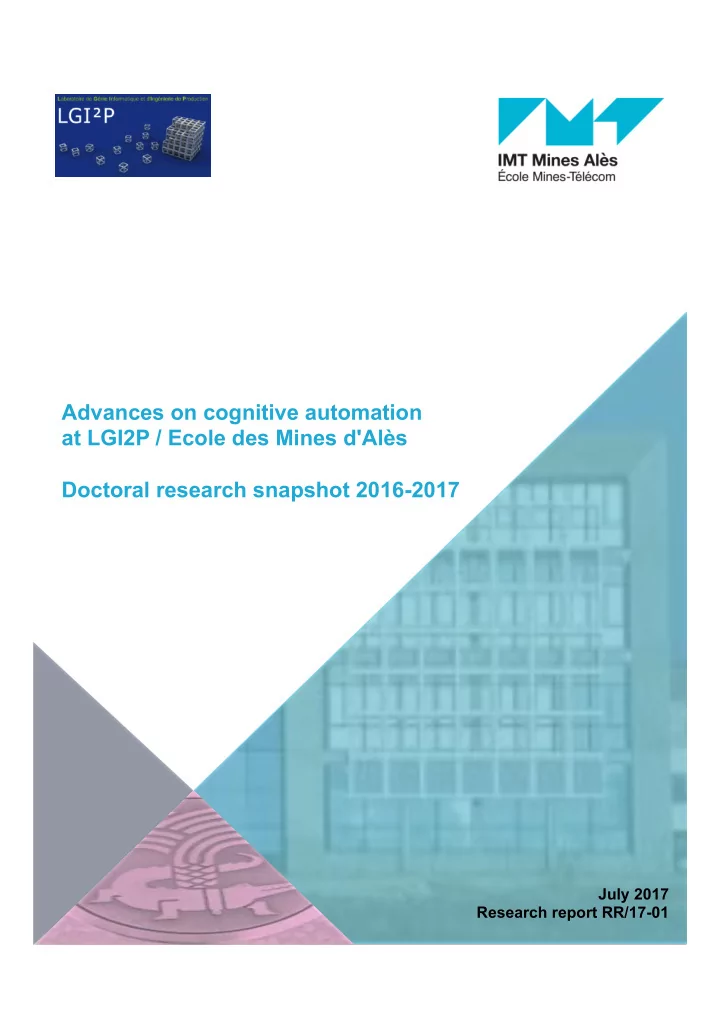

Advances on cognitive automation at LGI2P / Ecole des Mines d'Alès Doctoral research snapshot 2016-2017 July 2017 Research report RR/17-01
Foreword This research report sums up the results of the 2017 PhD seminar of the LGI2P lab of IMT Mines Ales. This annual day-long meeting gathers presentations of the latest research results of LGI2P PhD students. This year’s edition of the seminar took place on June 22nd. Thirteen PhD students presented their work for the past academic year. All presentations were followed by extensive time for very constructive questions from the audience. The aggregation of abstracts of these works constitute the present research report and gives a precise snapshot of the research on cognitive automation led in the lab this year. I would like to thank all lab members, among which all PhD students and their supervisors, for their professionalism and enthusiasm in helping me prepare this seminar. I would also like to thank all the researchers that came to listen to presentations and ask questions, thus contributing to the students’ PhD thesis defense training. A special thank to Yannick Vimont, head of the LGI2P lab since numerous years who will soon be joining Mines ParisTech. Thank you for providing me with the context to organize this yearly event and our monthly research seminars since 2009 ! I wish you all an inspiring reading and hope to see you all again for next year’s 2018 edition ! Christelle U RTADO
Contents First year PhD students Sabbah DIMASSI Page 5 Recommandation multicritère par filtrage collaboratif sur des modèles de préférences et des similarités fonctionnelles : le cas de la recherche d'un logiciel d'entreprise sur un comparateur Meyi DULEME Page 9 Monitoring de la charge cognitive dans le cadre de la gestion de crise Alexandre LE BORGNE Page 13 Towards versioning three-level component-based architectures Cécile LHERITIER Page 17 Contribution à l’amélioration des pratiques du retour d’expérience : Application au secteur de l’aide humanitaire Jean-Christophe MENSONIDES Page 21 Evaluation d’un risque politique par l’analyse d’articles de presse au travers de techniques de traitement automatique du langage naturel : le cas des déchets radioactifs Behrang MORADI KOUTCHI Page 25 Formalisation et évaluation des propriétés non fonctionnelles pour l'ingénierie de système de système : application à la résilience Jocelyn PONCELET Page 31 Définition et gestion centralisée de l’assortiment idéal dans un réseau de magasins de la grande distribution Second year PhD students Valentina BERETTA Page 37 Evaluation of data veracity using value confidence and source trustworthiness Gildas TAGNY NGOMPE Page 41 Extracting information from court decisions Third year PhD students Pierre-Antoine JEAN Page 46 On the definition of a knowledge inference model from relation extraction
Massissilia MEDJKOUNE Page 51 Towards a non-oriented approach for the evaluation of odor quality Diadie SOW Page 55 A possibilistic framework for identifying the most promising oerformance for improving complex systems Fourth year PhD students Hasan ABDULRAHMAN Page 61 Oriented filters for feature extraction in digital images: application to contours, corners detection, evaluation
First year PhD students Page 3
Page 4
������������������������������������������������� pr e f e r e n ce s and s imilarity of produ c t s : Appli c ation to SaaS s e ar c h e ngin e Sabah Dimassi 1,2 , Abdelhak Imoussaten 1 , Jacky Montmain 1 , François Trousset 1 , Marc Ricordeau 2 1 É ����������������������� LGI2P, 69 Rue Georges Besse, Nîmes, France 2 Cloud is Mine, appvizer, Cap Omega, Rond-point Benjamin Franklin, Montpellier, France !"#"$%&'("!!')('*+!,"-+!%./ Ab s tra c t . ������������������������������������������������������������������������������������ r- ������������������������������������������������������������������������������������������ their capabilities to quickly offer to users the most relevant results according to their needs. To improve the relevance of the search results, recommender systems are generally used within search engines to process ������ needs and preferences. In our project we are focusing our re- search on BtoB 1 recommender systems in order to improve the quality of the returned results by �������� ����� �������� ������� ������������� �� wever, time and data complexity represent con- ������������������������������������������������������������ intend to set up a professional refined recommender system that offers relevant results in reasonable time without bothering users with tedious questioning to get the required data in order to build their preference models. We suggest using MCDA 2 ��������������������������������������������������������������������������������� s- ����������������� inferred from collaborative filtering on users ��������������� functional similarities between products. This project is supported by Cloud is Mine, creator of the business SaaS 3 search engine appvizer. K e yword s : Recommender system (RS), MCDA 2 , Preference model, Similarity measure. 1 Introdu c tion Nowadays, recommender systems (RS) are being used in various fields and new research are done to improve [1] the relevance of their results. The interest in this area is high be- cause of the abundance of practical applications that help users to deal with a big amount of data and provide personalized relevant recommendations in reasonable time without being too data greedy while interacting with users [2]. Amazon.com and other vendors have in- corporated recommendation capabilities into their commerce servers in order to be as effi- cient as possible while giving personalized recommendations [3]. Despite of all these advances, the current generation of RSs still requires further im- provements to reach a higher level of efficiency. When dealing with BtoB 1 recommenda- tion, we may access to more information especially on users and then applications can pro- vide more personalized services by focusing on ������������������������������� . RSs are usually classified into different categories of recommendation: Content-Based (recommend similar products), Collaborative (recommend same products to similar users), Hybrid (combination of the two). In this kind of application, we are dealing with preference on 1 Business to business 2 Multiple Criteria Decision Analysis 3 Software as a Service Page 5
Recommend
More recommend